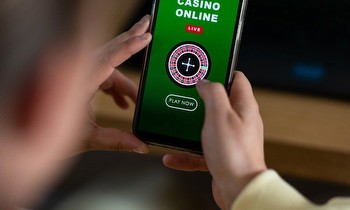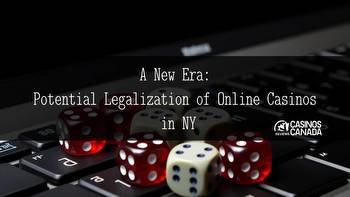Addabbo files bill to legalize online casinos in New York

A state senator wants to make New York the eighth state in the U.S. to legalize online casino gaming, also known as iGaming.
On Thursday, state Sen. Joseph Addabbo, D-Howard Beach, filed S8412, which would allow commercial and tribal casinos to offer online apps and websites that would allow people to play slot machines and table games from their computers or mobile devices.
Addabbo, who chairs the Senate Committee on Racing, Gaming and Wagering, said in a memo adjoined to the bill that New York’s early success in mobile sports betting makes offering online casino gaming a logical next step.
“New York quickly became the leading mobile sports betting market in the nation, generating nearly $70 million in tax revenue in a single month,” he wrote. “Similarly, if authorized, New York would quickly become the national leader in online casino gaming, generating hundreds of millions of dollars in tax revenue annually for the state as it continues to recover from the economic downturn caused by the COVID-19 pandemic.”
Addabbo’s bill notes a “conservative” estimate of $475 million in annual tax revenue from operators’ gross iGaming receipts. That’s based on a 25% tax rate in the bill.
The bill would allow each casino to partner with two online gaming platforms that would need to be approved by the New York State Gaming Commission. Apps from casinos would be subject to an initial licensing fee of $2 million, while independent operators that partner with casinos would pay a $10 million licensing fee. The senator said he expects the state to get about $150 million from the licensing fees, and the licenses would be good for 10 years.
States that currently allow iGaming include Connecticut, Delaware, Michigan, New Jersey, Pennsylvania and West Virginia. Nevada does not allow online slot machines or banked table games, but the state does allow online poker.
A spokesman for the iDevelopment and Economic Association (iDEA Growth), an online gaming industry group, said in a statement to The Center Square that Addabbo’s bill was a welcomed step forward.
“We have long argued that states must consider regulating online casinos games along with sports betting,” iDEA Growth State Advocacy Director John Pappas said. “Kudos to Sen. Addabbo for leading this effort to ensure that all online gaming consumers, not just sports bettors, are protected and that New York state reaps even more tax revenues. We urge lawmakers to give iGaming their full consideration.”
While sports betting is far more prevalent than iGaming, the states that have legalized online casinos have reported more revenue from that activity.
In New Jersey, the Division of Gaming Enforcement reported state-licensed online casinos earned $1.37 billion in revenues last year. That’s a nearly 41% jump from the $970.4 million they reported in 2020. Sportbooks reported revenues of $815.8 million in 2021, more than double the $398.5 million from a 2020 year that was somewhat affected by changes in sports schedules due to the COVID-19 pandemic.
New Jersey received $205.2 million in iGaming taxes last year and $102.2 million in sports betting taxes. Online casino operators pay a 15% tax on revenues, while sportsbooks pay a 13% tax on online revenue and an 8.5% levy on retail revenues.
In Michigan, the state’s Gaming Control Board reported adjusted gross revenues (AGR) of $110.6 million for its 14 licensed mobile sportsbooks and $1 billion for the 14 online casinos.
The state received $7.3 million in taxes from sport betting operators, which are taxed at 8.4 percent, and $201.7 million from iGaming operators, whose taxes range from 20% to 28% of AGR.
New York taxes online sportsbooks at 51%. That’s based on a rate set by operators that applied for licenses last year through a competitive bid process.
The iGaming bill also comes as New York considers issuing licenses for three brick-and-mortar casinos in the downstate region. Addabbo expects those licenses to fetch upwards of $2 billion combined for the state and add thousands of hospitality and construction jobs to a region that saw losses in those sectors because of the pandemic.
Other states, such as Indiana this year, have seen iGaming bills falter in the legislature for a variety of reasons. Some opponents fear offering iGaming would lead to reduced revenues for and eventually fewer jobs at brick-and-mortar casinos.
Those concerns have not panned out in iGaming states so far, and in states where live-action online table games are allowed, supporters say it leads to new dealer jobs.
Pappas added that iGaming can supplement and not take away from brick-and-mortar establishments.
“There’s also those consumers who would like to go to a casino but are intimidated about playing and sitting down at a poker table or a blackjack table because they don’t really know how to play,” he said. “You have to expend a lot of resources, a lot of financial commitment to sit down at a brick-and-mortar blackjack table or poker table. Whereas online, you can play for micro stakes, learn the game, understand the game and feel more comfortable to go into the live setting.”


































